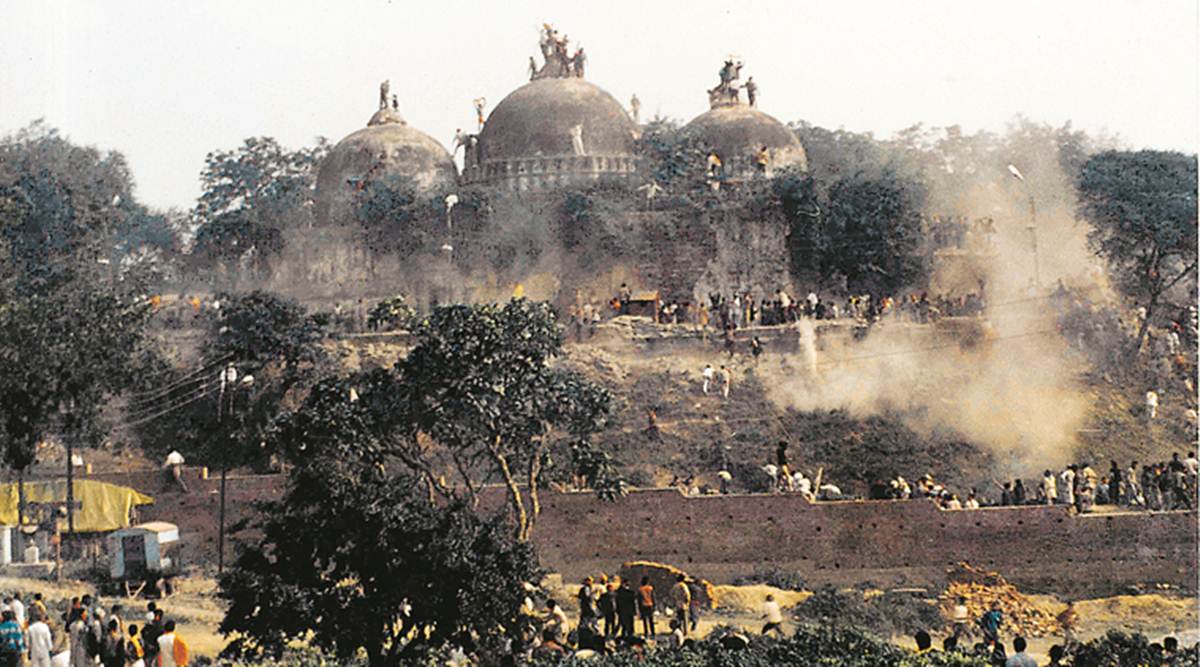 Babri Masjid was demolished in 1992 (Express Archive)
Babri Masjid was demolished in 1992 (Express Archive)Two orders of the Supreme Court in the last three years, both related to the Ayodhya dispute but in entirely different matters, pointed to the charge of conspiracy behind the demolition of the Babri Masjid on December 6, 1992.
On November 9, 2019, the more recent of the two orders, a Constitution Bench, while awarding the title suit to the Hindu parties and directing that the disputed land be handed over to a trust for construction of a Ram temple, called the destruction of the Babri Masjid a “calculated act” and “an egregious violation of the rule of law”.
In their 5-0 ruling, the then Chief Justice of India Ranjan Gogoi, Justices S A Bobde, D Y Chandrachud, Ashok Bhushan and S A Nazeer said: “During the pendency of the suits, the entire structure of the mosque was brought down in a calculated act of destroying a place of public worship. The Muslims have been wrongly deprived of a mosque which had been constructed well over 450 years ago.”
The order also recorded: “On 6 December 1992, the structure of the mosque was brought down and the mosque was destroyed. The destruction of the mosque took place in breach of the order of status quo and an assurance given to this Court. The destruction of the mosque and the obliteration of the Islamic structure was an egregious violation of the rule of law.”
More than two years before this order, the bench of Justices Pinaki Chandra Ghose and Rohinton F Nariman, on April 19, 2017, described the demolition of the Babri Masjid as “crimes which shake the secular fabric of the Constitution of India”.
Reviving the criminal conspiracy charge while ordering the transfer of proceedings from Rae Bareli to Lucknow, the bench directed that the additional charge of criminal conspiracy under IPC section 120B be framed against LK Advani, Murli Manohar Joshi, Uma Bharti, Vinay Katiyar, Sadhvi Rithambara and Vishnu Hari Dalmia (he died in 2019) – two others, Ashok Singhal and Giriraj Kishore, had passed away in 2015 and 2014, respectively.
It put them on joint trial with the kar sevaks in the 1992 case under various charges, including criminal conspiracy.
Earlier, there were two main proceedings, one each in Lucknow and Rae Bareli, based on two FIRs. In Lucknow, the accused, mostly the kar sevaks, faced charges relating to the demolition. In Rae Bareli, Advani and others were accused of instigating the crowd through speeches.
Justices Ghose and Nariman, while pulling up the CBI but allowing its appeal against the dropping of the conspiracy charge against the senior BJP leaders, said the Supreme Court was convinced it must use its power under Article 142 to do complete justice in the matter. “The Latin maxim fiat justitia ruat cælum is what first comes to mind on a reading of Article 142 — Let justice be done though the heavens fall,” it said.
“In the present case, crimes which shake the secular fabric of the Constitution of India have allegedly been committed almost 25 years ago. The accused persons have not been brought to book largely because of the conduct of the CBI in not pursuing the prosecution of the aforesaid alleged offenders in a joint trial, and because of technical defects which were easily curable, but which were not cured by the State Government,” the bench said.
While reviving the criminal conspiracy charges against the senior leaders of the BJP and shifting their trial from Rae Bareli, the bench also ordered restoration of charges against former UP Chief Minister Kalyan Singh but exempted him from prosecution on account of the constitutional immunity he enjoyed as Governor.
“Kalyan Singh, being the Governor of Rajasthan, is entitled to immunity under Article 361 of the Constitution as long as he remains Governor of Rajasthan. The Court of Sessions will frame charges and move against him as soon as he ceases to be Governor,” the bench said.
Kalyan Singh’s term as Governor ended in September 2019 and he appeared before the Lucknow court soon after to face charges.
📣 The Indian Express is now on Telegram. Click here to join our channel (@indianexpress) and stay updated with the latest headlines
For all the latest India News, download Indian Express App.